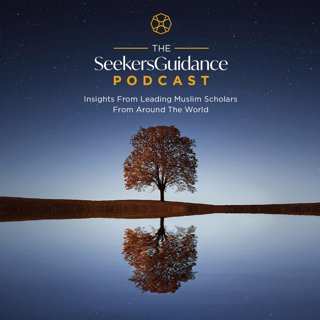
Branches of Faith – 01: Introduction – Shaykh Abu Bakr Ba-Dhib
In this introductory session on the Branches of Faith, Shaykh Muhammad Abu Bakr Ba-Dhib gives an introduction to the topic. He gives an overview of the history of the genre, the narrations regarding the branches and their number, and the great works on the Branches, before moving on on to introduce the text and its author. He will be covering a text entitled "'Iqd al-Juman fi Bayan Shu'ab al-Iman" (The Necklace of Pearls in Clarifying the Branches of Faith) by Imam Murtada al-Zabidi (d. 1205 AH). --- This is part of the series presented in Ramadan 2018: "Branches of Faith: The Virtues and Fruits of Faith". It is narrated that Prophet Muhammad (peace and blessings be upon him) said: "Faith is seventy some branches". In this series some of the leading scholars will cover and explain the different branches of faith, as they have come in the works of the Islamic tradition. The branches of faith include (1) branches of belief and certitude, (2) branches of spiritual works, and (3) branches of social excellence. --- For more SeekersGuidance podcasts and podcast shows, visit seekersguidance.org/podcasts. Help Seekersguidance build a Global Islamic Seminary and spread the light of guidance to millions around the world by supporting us through monthly donation by going to https://seekersguidance.org/donate - your donations are tax deductible in the US and Canada.
18 Maj 201833min

The Gifted Mercy – Shaykh Faid Mohammed Said
In this podcast Shaykh Faid Mohammed Said explains the different opportunities we have to attain the gifts of mercy that Allah Most High has provided us. Shaykh Faid begins by talking about the difficulties that Prophet Muhammad (peace and blessing be upon him) and his family went through. However, through the difficulties we see a complete portrayal of mercy through the Prophet's choices (peace and blessing be upon him). He explains that life is about choices, and that the best of choices is choosing to be somewhere Allah is remembered. Shaykh Faid then mentions some of the virtues of the month of Sha'ban. It was from prophetic practice to fast most of the month of Sha'ban. The Prophet (peace and blessing be upon him) informed us that Sha'ban is a month where out deeds are presented before Allah, and that he wanted his deeds to be presented while in a state of fasting. Shaykh Faid goes on to discuss that among the signs of and accepted repentance, is being eager to perform acts of worship. A believer should never despair. Allah is happy when his servants repents. The Mercy of Allah covers over everything. A believer should be humble when asking Allah, this is from prophetic practice. A believer should be in a state of happiness while worshipping Allah. The purpose of worship is to purify oneself. For more SeekersGuidance podcasts and podcast shows, visit seekersguidance.org/podcasts. Help Seekersguidance build a Global Islamic Seminary and spread the light of guidance to millions around the world by supporting us through monthly donation by going to https://seekersguidance.org/donate – your donations are tax deductible in the US and Canada.
10 Maj 20181h 1min

Surat al-Kahf: Keys of Faith – Shaykh Faraz Rabbani
In this Friday sermon, Shaykh Faraz begins by reminding the believers that the first ten verses of Surat al-Kahf are a protection from the Dajjal as Prophet Muhammad (peace and blessings be upon him) has informed us. The verses are gifts of mercy, and each verse is a key to mercy. The sunna of the Prophet (peace and blessing be upon him) in its entirety is mercy, and following the sunna in preserving the first ten verses of Surat al-Kahf is a key to attain on to that mercy. It is a protection from the Dajjal. The Dajjal preys on weakness of faith and attacks those who have weak faith. In time of confusion hold fast to the Qur’an. One of the keys to faith is to make regular practice to recite the first ten verses of Surat al-Kahf. Surat al-Khahf is a summation of faith and the lessons of Surat al-Kahf are summarized in the first ten verses. Shaykh Faraz ends the khutba by reminding the believers of the reward and merit of the month of Sha'ban. For more SeekersGuidance podcasts and podcast shows, visit seekersguidance.org/podcasts. Help Seekersguidance build a Global Islamic Seminary and spread the light of guidance to millions around the world by supporting us through monthly donation by going to https://seekersguidance.org/donate – your donations are tax deductible in the US and Canada.
3 Maj 201834min

Prophet Muhammad’s ﷺ Teaching on How to Praise and Thank Allah – Shaykh Faid Mohammed Said
In Surat al-Fatiha the believer says "Praise be to Allah, Lord of all the worlds” this is teaching us how to thank Allah. In a hadith Prophet Muhammad (peace and blessing be upon him) said: “Praise be to Allah, as much as the number of all created things." "Praise be to Allah for as much as His creation in the heavens and earth, and as much as His books have counted." Shaykh Faid reminds the believers to keep praising and thanking Allah. Prophet Muhammad (peace and blessing be upon him) thanked Allah even when there was no food in his house. There is always something to praise and thank Allah Most High for. For more SeekersGuidance podcasts and podcast shows, visit seekersguidance.org/podcasts. Help Seekersguidance build a Global Islamic Seminary and spread the light of guidance to millions around the world by supporting us through monthly donation by going to https://seekersguidance.org/donate – your donations are tax deductible in the US and Canada.
19 Apr 20189min

Benefits of Reciting Qur’an Daily – Shaykh Faid Mohammed Said
In this podcast Shaykh Faid Mohammed Said explains the benefits of reciting and connecting with the Qur’an on a daily basis. He reminds us all that the people of the Qur'an are the elite people of paradise. They are in the best of stations, and they constantly say words of goodness in this life. Just as one is careful what they intake into their bodies , one should be careful of what one listens to. Shaykh Faid counsels everyone to only listen to that which is of benefit . And what is better than reciting and listening to the words of Allah? For more SeekersHub podcasts and podcast shows, visit seekersguidance.org/podcasts. Help Seekershub build a Global Islamic Seminary and spread the light of guidance to millions around the world by supporting us through monthly donation by going to https://seekersguidance.org/donate – your donations are tax deductible in the US and Canada.
9 Apr 201821min

What Does it Mean to Love Allah and Love for Allah – Shaykh Faraz Rabbani
In this khutbah, Shaykh Faraz Rabbani reminds the believers of what it means to love Allah and love for Allah. He highlights that the greatest quality a believer can strive to attain in their lives is the love of Allah. The highest praise Allah grants to a believer is to be beloved to Him. And the the highest quality a believer can have is to be beloved by Allah. Shaykh Faraz explains what love is, and what does love for Allah entail. He distinguishes between a servant obeying Allah, and a servant loving Allah. The highest motivation for a believer is to be beloved by Allah. Shaykh Faraz ends by explaining that Allah loves the one who takes all means for the love of Allah alone, while loving all else out of the love of Allah. --- This Friday khutba was delivered by Shaykh Faraz at Jamiat-ul-Ansar (www.jamiatulansar.ca/) in Brampton, in March 2018. For more SeekersGuidance podcasts and podcast shows, visit seekersguidance.org/podcasts. Help Seekersguidance build a Global Islamic Seminary and spread the light of guidance to millions around the world by supporting us through monthly donation by going to https://seekersguidance.org/donate – your donations are tax deductible in the US and Canada.
31 Mars 201824min

What Does it Mean to Seek Allah’s Forgiveness – Shaykh Faraz Rabbani
In this khutbah, Shaykh Faraz Rabbani reminds the believers of the amazing gift the people of faith have been given, and that is the gift of seeking Allah’s forgiveness (istighfar). The prophet Muhammad (peace and blessing be upon him) would ask Allah for forgiveness 70 or sometimes 100 times in a single sitting. Shaykh Faraz goes on to explain why the Prophet (peace and blessing be upon him) would ask for forgiveness if he is divinely inspired and protected from error. He explains what (istighfar) seeking Allah’s forgiveness means. It is vaster than simply asking for forgiveness. It is shielding from harm, and warding off any harm. Engaging in (istighfar) seeking Allah's forgiveness, is asking Him to ward off all that is unbecoming, and to grant one all good qualities. He ends by reminding us that the focus in seeking forgiveness, is seeking divine help, and expressing neediness to Allah Most High. --- This Friday khutba was delivered by Shaykh Faraz at the University of Toronto in March 2018. For more SeekersGuidance podcasts and podcast shows, visit seekersguidance.org/podcasts. Help Seekersguidance build a Global Islamic Seminary and spread the light of guidance to millions around the world by supporting us through monthly donation by going to https://seekersguidance.org/donate – your donations are tax deductible in the US and Canada.
30 Mars 201832min

Feed the People – Shaykh Faid Mohammed Said
Bismillah-ir Rahman-ir Raheem When the Nur (sallallahu alayhi wasalam) entered Madinah, it was narrated by the lead Jewish Rabi of the city that Rasulullah (sallallahu alayhi wasalam) said: “Spread peace, feed people and pray at night when others are asleep.” This past week in the UK has been one of the most extreme in terms of the cold weather conditions, and as such, although we complain of the cold whilst seated in warmth, we forget about our fellow community, who do not have the choice to complain, but rather have to survive and suffer through these conditions. As such, in trying to act upon the words of our Beloved (sallallahu alayhi wasalam), by spreading peace and comfort, feeding people and praying at night so we become a part of the Nur, The Nur Team were upon the streets of London on Sunday (4th March) evening as well as other organisations distributing food, hot drinks, and essential items to the needy. The purpose of this Deen is to serve the needy and to serve one another. Alhamdulillah more than 150 people were fed that evening. A mini documentary has been put together with a beautiful message given by Shaykh Faid and to also share the experience. “ And We have not sent you other than as a Mercy to all the worlds.” (Surah Al-Anbya, 107) Be Mercy. Be Nur. Be Hope. Shaykh Faid Mohammed Said Watch and #ShareTheNur! Allahumma salli alaa Nur. For more SeekersGuidance podcasts and podcast shows, visit seekersguidance.org/podcasts. Help Seekersguidance build a Global Islamic Seminary and spread the light of guidance to millions around the world by supporting us through monthly donation by going to https://seekersguidance.org/donate – your donations are tax deductible in the US and Canada.
20 Mars 20187min





















